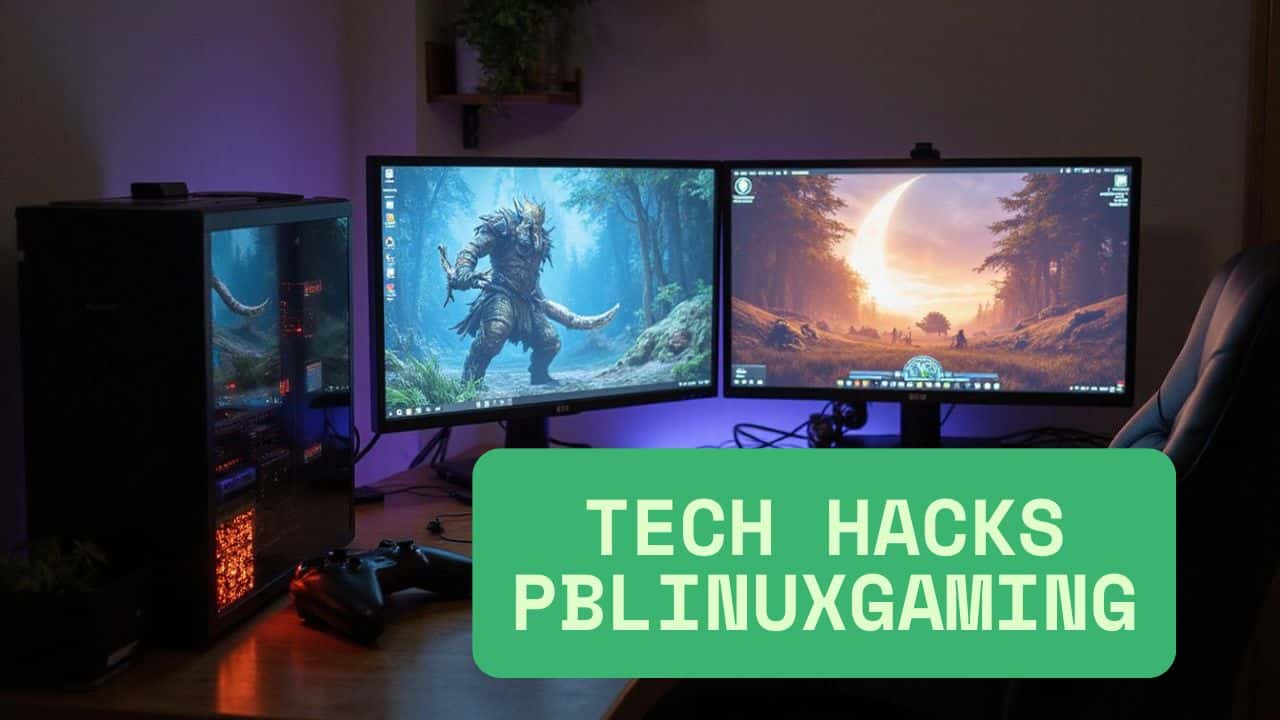Introduction
Linux gaming has transformed from a niche experiment into a powerful, mainstream option. Thanks to open-source tools and active communities like PBLinuxGaming, gamers now enjoy smoother performance, broader compatibility, and a truly customizable experience. But to get the most out of your Linux system, a few clever “tech hacks” can make all the difference.
This guide explores practical strategies that enhance frame rates, reduce stutter, improve visuals, optimize controllers, and secure your system—all tested and trusted by Linux gaming enthusiasts. From tools like GameMode and Proton GE to system-level tweaks, graphical enhancements, and network optimizations, we’ll cover everything you need to create a high-performance Linux gaming environment.
Whether you’re a casual player or a competitive gamer, these hacks ensure that your setup is efficient, stable, and future-proof. Let’s dive in and unlock the full power of Linux gaming.
Must-Have Tools for Every Linux Gamer
- GameMode for On-Demand Performance
GameMode, created by Feral Interactive, boosts CPU performance, adjusts I/O priority, and suspends background tasks while gaming. It can be launched directly through Steam or manually with thegamemoderuncommand. For even better tracking, pair it with MangoHud to display FPS, CPU/GPU usage, and frame times in real time. - Proton GE for Compatibility
While Steam’s Proton already allows thousands of Windows games to run on Linux, Proton GE (Glorious Eggroll) adds patches and fixes for more demanding titles. It often resolves crashes and ensures smoother gameplay for AAA releases. - Lutris and Heroic Launcher
Lutris manages games from multiple sources (GOG, Epic Games, DRM-free), while Heroic offers a polished interface for Epic and GOG titles. Together, they provide flexibility and a central hub for all your games.
Performance Hacks That Deliver
- Kernel Tweaks for Responsiveness
Switching to a gaming-optimized kernel (like Zen or Liquorix) can cut down latency and improve input response. Adjusting system settings such as loweringvm.swappinessand enabling hugepages also helps prevent memory bottlenecks. - Boost Graphics with vkBasalt
vkBasalt is a Vulkan layer that lets you apply post-processing effects such as sharpening, HDR, and FXAA. It improves visuals without hurting frame rates, making it a favorite among performance-minded Linux gamers. - Storage Optimization
Installing games on SSDs dramatically reduces load times. Clearing cache files from Proton or Wine directories can also prevent system slowdowns and graphical glitches.
Compatibility and Input Optimization
- Anti-Cheat Challenges
Many online games use anti-cheat software that historically blocked Linux users. Modern solutions like Proton GE include patches to bypass these restrictions. Using separate Wine prefixes for each game also minimizes conflicts. - Controller Tweaks
Steam Input offers advanced remapping, dead-zone adjustments, and button overlays. For more control, tools likexboxdrvandevdevallow deep customization of polling rates and hotplug behavior. Disabling your keyboard or touchpad when using a controller can prevent accidental inputs during play.
Networking Hacks for Online Stability
- Lowering Latency
Apply the BBR TCP congestion control algorithm to optimize packet flow. Switching to fast DNS servers such as Cloudflare or Google can shave off valuable milliseconds in multiplayer games. - Disable Compositors
Desktop compositors often introduce input lag. Temporarily disabling them during gameplay can improve frame pacing and responsiveness, especially for competitive titles.
Security and Long-Term Maintenance
- Sandboxing Games
Running games inside a Firejail sandbox protects your system from unsafe executables. Flatpak is another option, isolating games from the core operating system. - Update Wisely
Rolling-release distributions deliver the latest graphics drivers and gaming tools, but frequent updates can introduce instability. Always back up your system before major upgrades. - Safe Downloads Only
Stick to trusted platforms like Steam, GOG, and verified Lutris scripts. Avoid cracked or third-party downloads, as they may contain malware or compromise your system’s security.
Read More: Top Tech News Sources for Feedworldtech Fans
Conclusion
Linux gaming is no longer just about experimentation—it’s about delivering a polished, high-performance experience that rivals traditional platforms. With the right tools and optimizations, you can enjoy smoother gameplay, enhanced visuals, and broader game compatibility while keeping your system stable and secure.
GameMode ensures that your system dedicates resources where they matter most, Proton GE opens doors to thousands of Windows titles, and tweaks like vkBasalt add polish without sacrificing performance. Combined with controller tuning, networking improvements, and strong security practices, these PBLinuxGaming hacks give you full control of your gaming environment.
The future of Linux gaming is brighter than ever. With each update, developers and communities are working to improve compatibility and performance, ensuring that players can focus on what matters most—enjoying their favorite games.
FAQs
- How can I improve FPS in Linux games?
Enable GameMode, switch to a low-latency kernel, use vkBasalt for lightweight enhancements, and store games on SSDs for faster load times. - Which is better for running Windows games on Linux: Wine or Proton?
Proton (especially Proton GE) is generally better for Steam games, while Wine and Lutris offer flexibility for non-Steam titles. - How do I fix controller issues in Linux games?
Use Steam Input for remapping and fine-tuning, or tools likexboxdrvandevdevfor deeper customization and reduced latency. - Can Linux handle anti-cheat games like Fortnite or Destiny 2?
Some anti-cheat systems still pose challenges, but Proton GE and developer support are steadily improving compatibility. - Is Linux secure for gaming?
Yes. By sandboxing games, sticking to trusted sources, and keeping your system updated, Linux gaming remains safe and reliable.
